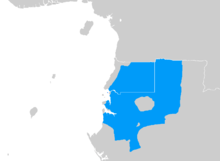Fang language
| Fang | |
|---|---|
| Pangwe | |
| Native to | Equatorial Guinea, Gabon, Republic of the Congo, and Cameroon |
| Ethnicity | Fang people |
Native speakers | 1 million (2006–2013)[1] |
| Dialects |
|
| Language codes | |
| ISO 639-2 |
fan |
| ISO 639-3 |
fan |
| Glottolog |
fang1246[2] |
A.75,751[3] | |
 | |
Fang /ˈfɒŋ/ is the dominant Bantu language of Gabon and Equatorial Guinea. It is related to the Bulu and Ewondo languages of southern Cameroon. Fang is spoken in northern Gabon, southern Cameroon, and throughout Equatorial Guinea. Under President Macías Nguema, Fang was the official language of Equatorial Guinea.
There are many different variants of Fang in Gabon and Cameroon. Maho (2009) lists Southwest Fang as a distinct language. The other dialects are Ntumu, Okak, Make, Atsi (Batsi), Nzaman (Zaman), Mveny.
Phonology[4]
Vowels
Fang has 7 vowels, each of which can have short or long realizations.
| Front (short/long) | Back (short/long) | |
|---|---|---|
| Close | i iː (ĩ) | u uː (ũ) |
| Close-mid | e eː (ẽ) | o oː (õ) |
| Open-mid | ɛ ɛː (ɛ̃) | ɔ ɔː (ɔ̃) |
| Open | a aː (ã) | |
Nasal vowels are allophones of the respective oral vowels, when followed by a nasal consonant [ŋ] or [ɲ]. Words can not start with [ɛ], [i], [ɔ] nor [u].
Diphthongs
Diphthongs can be a combination of any vowel with [j] or [w], as well as [ea], [oe], [oa], [ua].
Tone
Fang distinguishes between 4 different tones, conventionally called: high, low, rising and falling. The former two are simple tones, while the latter are compound tones. One vowel in a sequences of vowels can be elided in casual speech, though its tone remains and attaches to the remaining vowel. [5]
Consonants
In Fang, there are 24 consonants. The majority of them can become prenasalized:
| Labial | Dental | Alveolar | Alveopalatal | Velar | Glottal | |
|---|---|---|---|---|---|---|
| Nasal | m | n | ɲ | ŋ | ||
| Stop | p b mp mb |
t d nt nd |
k ɡ ŋk ŋg k͡p ɡ͡b ŋk͡p ŋɡ͡b |
ʔ | ||
| Affricate | t͡s d͡z nt͡s nd͡z |
|||||
| Fricative | f v ɱf ɱv |
s z ns nz |
h | |||
| Approximant | l | j ɲj |
w nw |
|||
| Tap | ɾ |
/h/ is only used in interjections and loanwords. Words can not start with /ŋ/, except when followed by a velar consonant. /ɾ/ and /z/ also are restricted from word-initial position. /g/ and /p/ can only come in word-initial position in words of foreign origin, although in many of these cases, /g/ becomes realized as [ŋg].
Phrases
As the Fang language does not have an official orthography, the following list may not be entirely accurate; one issue of note is the lack of marking for tones. Regardless, common phrases for the Oyem area of northern Gabon include:
| English | Fang |
|---|---|
| Hello (to one person) | M'bolo |
| Hello (to several people) | M'bolani |
| Hello (response) | Am'bolo; Am'bolani |
| How are you? | Y'o num vah? |
| response | M'a num vah |
| Where are you going | Wa kuh vay? |
| I'm going home | Ma kuh Andah |
| I'm going to school | Ma ke see-kolo |
| I'm going for a walk | Ma ke ma woolou |
| I'm hungry | Ma woh zeng |
| I'm sick | Ma kwan |
| I understand French | Ma wok Flacci |
| I don't understand Fang | Ma wok ki Fang |
| I don't speak Fang | Ma kobe ki Fang |
| What did you say | Wa dzon ah dzeh? |
| I said... | Ma dzon ah... |
| Holy cow! | A tara dzam! |
| I want to eat | Ma cuma adji |
| Thank you | Akiba |
See also
References
- ↑ Fang at Ethnologue (18th ed., 2015)
- ↑ Hammarström, Harald; Forkel, Robert; Haspelmath, Martin; Bank, Sebastian, eds. (2016). "Fang (Equatorial Guinea)". Glottolog 2.7. Jena: Max Planck Institute for the Science of Human History.
- ↑ Jouni Filip Maho, 2009. New Updated Guthrie List Online
- ↑ Bibang Oyee, Julián-Bibang (2014). Diccionario Español-Fang/Fang-Español. Akal.
- ↑ Bibang Oyee, Julián (1990). Curso de lengua fang. Centro Cultural Hispano-Guineano
External links
- http://monefang.com/dico/dico.php
- http://www.guinea-ecuatorial.info/Vocabulario_Castellano_Fang_Catala.html Vocabulario castellano-fang-catalán online
- Bantulanyi
- PanAfriL10n page on Beti (incl. Fang)
- http://www.dicts.info/1/fang.php